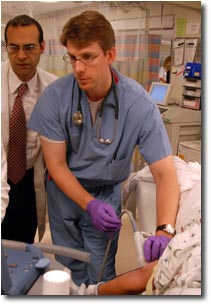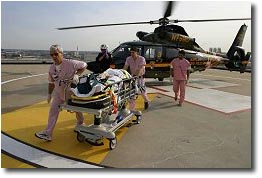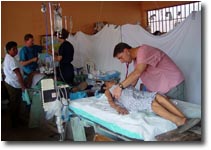 |
The University of Maryland's Department of Emergency Medicine has strong track record of educating physicians at all levels of training. Our postgraduate fellowship training programs offer a variety of opportunities for continuing training and specialization within the field of Emergency Medicine. Emergency Medical Services, International Emergency Medicine, Ultrasound, and Research are our established fellowship disciplines, and our educational offerings are regularly reviewed in order to best address the training and specialization needs of the EM community.
In order to guide you in your early consideration of committing to fellowship training, we have condensed and reprinted the excellent overview of this topic from the NEJM Career Center website by B. Darves below.
Physicians who plan to work in an academic environment frequently pursue a fellowship because many teaching institutions prefer it. If you aren’t decided how or where you want to practice, it makes your fellowship decision less clear-cut. After all, fellowships — whether one or several years in duration — delay transition from training to active practice, often at a considerable economic cost, with the expectation that the investment will pay off later in their careers. According to data gathered by the American Medical Association’s Division of Undergraduate and Graduate Medical Education Policy and Standards, an estimated 25 percent of residents pursue fellowships or additional training after residency. The financial bottom line: Physicians who complete fellowships generally have higher lifetime earning potential than do generalists.
Economic and lifestyle benefits notwithstanding, the decision to pursue a fellowship should be based, ideally, on personal interest and career satisfaction, says Marvin Dunn, M.D., director of residency review activities for the Accreditation Council for Graduate Medical Education (ACGME) and a former medical school dean. “I give residents the same advice I gave to medical students — carefully select the field or area you think you will enjoy working in most, and you will be rewarded, regardless of the reimbursement,” Dr. Dunn says. Many physician-fellows choose their program for experiences that were different from the ones during residency.
Look beyond basic program descriptions and statistics before applying to or making a final decision about a fellowship. The following tips will help you avoid potential pitfalls:
 |
Most fellowship programs will arrange for prospective fellows to meet with current fellows (without faculty present) during a visit to the institution, and this meeting can provide valuable insight into the pluses — and minuses — of the program. During this time, ask specific questions about the fellow's scope of responsibility, work hours, and case or procedure volume. Find out if fellows have clearly delineated responsibilities and whether teaching requirements, are clear. In addition, talk to fellowship graduates who are a few years out of the program to find out how the fellowship affected their professional life.
Identifying the top fellowship programs is mostly accomplished by word-of-mouth, but you should consider factors other than the program’s reputation. For example, determine whether the program’s slots are consistently filled year after year and whether there has been frequent turnover in the directorship. A low fill rate or frequent changing of the guard may portend problems. Also, research the hosting institution to identify any financial difficulties that could affect the fellowship.
 |
ACGME’s accreditation system assures that programs meet standards of teaching quality, fellow oversight, and working environment, among others. Still, not all subspecialties require or are eligible for accreditation, and an unaccredited fellowship may be very high quality. Some programs remain unaccredited because doing so permits them to bill Medicare for direct care of patients. Others establish the fellow in a part time faculty position, which accommodates their course of study and also addresses billing issues.
NOTE: The author, Bonnie Darves, is an independent health care writer based in Lake Oswego, Oregon.